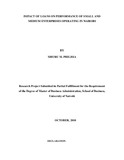| dc.description.abstract | A bigger financial leverage of SMEs is associated with higher profit and sales growth. Debt may thus serve as an incentive to perform well, particularly for young start-up firms. Higher leverage may also reflect a firm's quality in the sense that more talented entrepreneurs are willing and able to obtain more credit. The objective of the study was to establish the impact of loan advancement on the performance of the SMEs. The study used simple random sampling technique to sample the population of these SME's.
The study used -secondary data obtained from the annual financial accounts comprising three years before loan advancement and three years after loan advancement. The key ratios computed are; Return on Assets Ratio, Return on Equity Ratio, Profit Margin Ratio and Debt Ratio. t- Test for the sample means was analyzed with the help of SPSS to test the hypothesis that there is relationship between the loans advanced and the performance of theSMEs.
The findings indicate that there was significant improvement in performance of the SMEs after loan advancement. The results for the measures of performance, that is, four out of four ratios showed a significant difference in t-test statistic, implying a change in SMEs performance after . loan advancement. This confmned the theoretical assertion that firm performance improves with debt leverage. | en_US |

